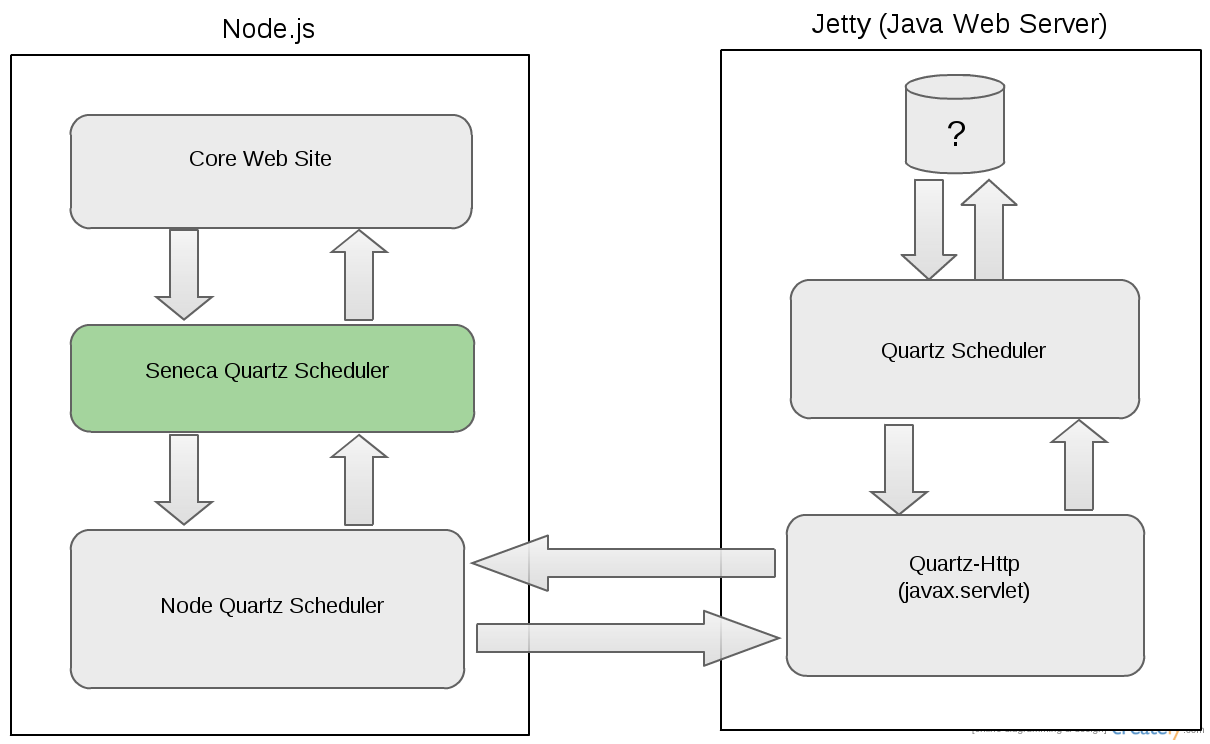A scheduler plugin for the Seneca toolkit that wraps node-quartz-scheduler.
Quartz does not expose HTTP services by itself - you'll need to build (maven) a war file from quartz-http.
If you're using this module, feel free to contact us on twitter if you have any questions: @wildfiction or @darsee
Supports Seneca versions 1.x and 2.x
npm install seneca
npm install seneca-quartz-scheduler
You'll need the seneca module to use this module - it's just a plugin.
To load the plugin:
seneca.use('quartz-scheduler', { ... options ... })
For available options, see node-quartz-scheduler.
Schedule a single future event:
var seneca = require('seneca')();
seneca.use('quartz-scheduler');
seneca.ready(function(err){
if( err ) return console.log(err);
// Setup the receiver.
// When the scheduler calls back to your web site then the cmd 'event'
// is raised on the 'scheduler' micro-service. By hooking into this
// you can route the executed event to the appropriate place, usually
// another micro-service.
this.add({role:'customRole', cmd:'myCommand'}, function(args, callback){
var seneca = this;
// args contain the payload you sent to the scheduler when you originally
// set-it-up with the 'register' cmd.
var name = args.name; // hello world
// Hence the scheduler can call any microservice that you have in your application.
// The only restriction is that the payload needs to be serializable into JSON
});
// Register an event (job) to fire at some point in the future...
seneca.act({
role:'scheduler',
cmd:'register',
when: new Date(2016, 5, 1),
args: {role: 'customRole', cmd: 'myCommand', name: 'hello world'}
}, function(err, data) {
// If there is no error then data will have a property called jobId.
// This was generated by the quartz-scheduler and you should store this
// if you ever want to cancel or update the job that you just scheduled.
// If you never want to cancel or update the job then you can discard this value.
var jobId = data.jobId;
}
);
})All actions provide results via the standard callback format: function(error,data){ ... }.
Register a task with the scheduler.
- when: a Date object
- args: A JSON object of the seneca command you want executed to you when the scheduler triggers
To see what this plugin is doing, try:
node your-app.js --seneca.log=plugin:quartz-scheduler
This will print action logs and plugin logs for the user plugin. To skip the action logs, use:
node your-app.js --seneca.log=type:plugin,plugin:quartz-scheduler
For more logging options, see the Seneca logging tutorial.
The Senecajs org encourage open participation. If you feel you can help in any way, be it with documentation, examples, extra testing, or new features please get in touch.
Run tests with:
npm test
You'll need a scheduler running for the tests to communicate with.
Copyright (c) 2014-2016, Seamus D'Arcy and other contributors. Licensed under MIT.


